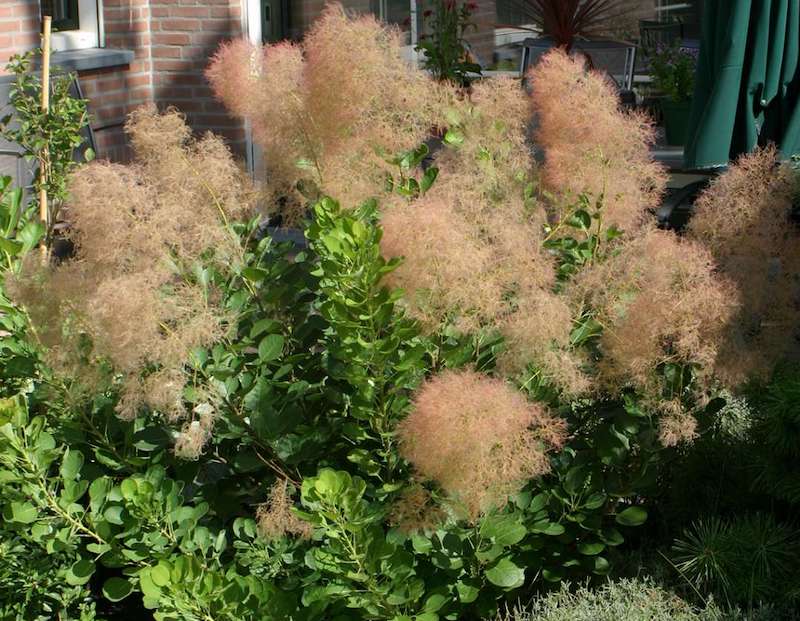The Smoke Tree (Cotinus spp.) is an excellent choice for bringing color and texture to your landscaping. What makes this plant even more appealing is that it is a relatively pet friendly plant. Being in the cashew and sumac family, the sap of the Smoke Tree is mildly toxic as it does have the potential to cause skin irritation in humans. Care should be taken when pruning and working around the plant. The Smoke Tree does not have any culinary and herbal uses. An essential oil with a mango-like scent can be obtained from the leaves, and a yellow-to-orange dye can be made from its roots.

Are Smoke Trees Poisonous to Children?
The sap of Smoke Tree can cause skin irritation, so children should be supervised when playing around these plants, especially if they have sensitivity to urushiol, the irritant found in poison ivy. Touching the plant alone is not enough to cause a reaction, as it is the sap that contains the irritant. The seeds of these plants can also contain tannins and toxins.
Are Smoke Trees Poisonous to Dogs?
Animals, both wild and domestic, are not typically drawn to the Smoke Tree as a food source. With leaves and branches full of tannins, the Smoke Tree is not particularly delicious, which is one reason why it makes an excellent landscaping plant for those near wooded areas. The leaves and sap may cause irritation, vomiting, or diarrhea when consumed.
Are Smoke Trees Poisonous to Cats?
Similar to dogs and other animals, cats usually leave Smoke Trees alone. Smoke Trees are bitter, so they are not an enjoyable snack. The leaves and sap may cause irritation, vomiting, or diarrhea when consumed.
Are Smoke Trees Poisonous to Other Animals?
Smoke Trees do not taste good. For this reason, they are considered deer resistant. Deer and other animals tend to avoid eating Smoke Trees, so you might expect other domestic and wild animals to do the same.
Symptoms Of Smoke Tree Poisoning
When consumed, all parts of the Smoke Tree may cause nausea, vomiting, and diarrhea. When you come in contact with the tree’s sap, dermatitis might occur, similar to what you might expect with poison ivy. Always check with your doctor or veterinarian for guidance if you suspect Smoke Tree poisoning.
Here are some common symptoms to look out for:
- Skin irritation
- Nausea
- Vomiting
- Diarrhea
Preventing Smoke Tree Poisoning
Though Smoke Trees are only considered mildly toxic to humans and pets, you may want to provide a bit of extra protection against curious children and pets. A physical barrier is the best defense for keeping pets and children away from Smoke Trees. That being said, Smoke Tree is one of the recommended pet friendly ornamental plants. Because wild animals also tend to avoid Smoke Tree, it can even be used as a barrier to protect other plants from grazing.
Pet Poison Helpline
If something were to happen to your furry friend, and you suspect that they are suffering from Smoke Tree poisoning, there is a poison control hotline to call for 24/7 vet advice. It is called the Pet Poison Hotline, and their phone number is (855) 764-7661.
Sources:
"Cotinus coggygria." Practical Plants. practicalplants.org
"Cotinus coggygria." The North Carolina Extension Gardener Plant Toolbox. plants.ces.ncsu.edu
 |
Author Lynn Gusman - Published 7-27-2023 |
